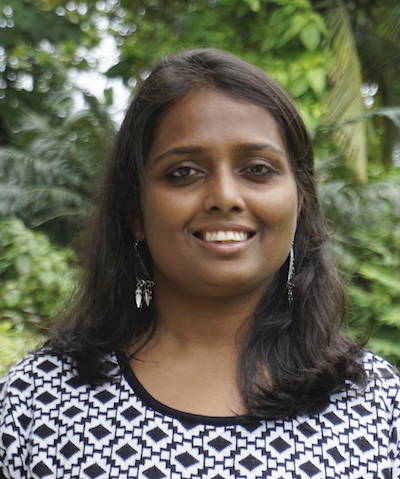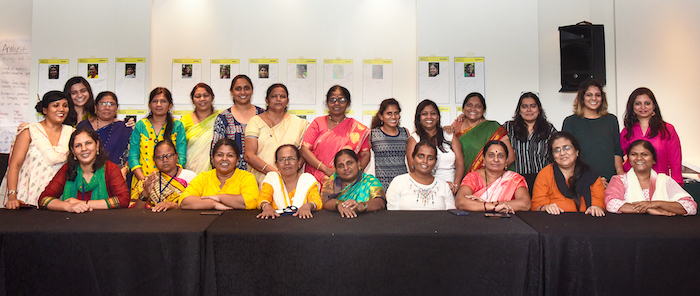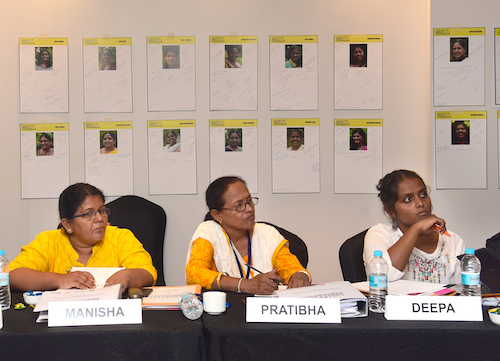Meet Rise Up Collective Impact Partnership (CIP) Leader Deepa Pawar. CIP is a collaboration that leverages the powerful work of Rise Up, How Women Lead, the Public Health Institute, Global Fund for Women, and World Pulse to increase the economic power of women and girls in India. Deepa is the founder and director of Anubhuti, a young women-led organization working for equity, justice, and democracy.
With support from Rise Up and CIP partners, Deepa is advocating to advance implementation of India’s national Prevention of Sexual Harassment at the Workplace Act so that all government-aided colleges in Maharashtra institute internal complaint committees, enabling women to more effectively report complaints of sexual harassment. The ability to report complaints of sexual harassment contributes to a safer education environment for women, expands their access to colleges, increases their employability, and contributes to their ability to be economically independent.

Deepa Pawar, CIP Leader from India
Q: In your work with women and girls in India, what do you find motivates you most?
The thing that motivates me most is the commitment and compassion girls and young women bring to their work for social change. These groups are from the most deprived communities and are well aware of existing social issues and hierarchies, as well as strategies for changing them, because they live these realities every day. I have observed and experienced the same in my own Gadiya Lohar tribe community.
I am inspired by the struggles and leadership of girls and women who started working at the grassroots level at a young age and have brought about changes in history. Most social change movements have been formed and led by women and girls around the world and in India. Anti-rape laws, the Chipko movement, laws against sexual harassment in the workplace, laws against domestic violence, and today’s student movements against discrimination on campus have all been led by women and girls. I am motivated by their resilience, resourcefulness, and risk-taking while adhering to democratic values of peace and non-violence.
Q: What accomplishments are you most proud of?
I am most proud of the accomplishments in my own family and community. As mentioned, I belong to the Gadiya Lohar nomadic tribe, which is an extremely vulnerable community in the caste-divided society of India. Housing, food, safety, and dignity – are all in severe shortage. Girls in my community are married off at as young as 8 years old. Out of this context, my family of five sisters are all educated or are completing their higher education and I am among the very few women post-graduates of my tribe. Almost all of the women in my family are economically independent, including my mother.
Our family’s independence is the result of our circumstances. My father was rare in supporting his daughters’ education. When I was fifteen, his untimely death caused extreme hardship for us, but it also meant that we became a family of women decision-makers. My mother had no option but to be economically independent. My sisters and I had no option but to start working when we were very young. As the oldest in my family, when I completed school with good grades, it created an example for my sisters to persevere in focusing on their education, no matter the struggle that followed.
Seeing us and our growth helps motivate other girls and young women to continue their education; and more male members of the community are supporting these steps and are respecting their partners’ choice of dress, their mobility, and their dignity. The main ‘panch‘ (group of community leaders) in Maharashtra even organized a gathering to celebrate my winning of the University of California, Berkeley, Tell Her Story contest. This was the first time a woman was honored in a public event by the community. These are big accomplishments for the rights of women and girls, and for increasing the compassion of men and boys in my community.

Deepa (front, fourth from right) and CIP Leaders at the 2019 Collective Impact Training in India.
Q: What are the biggest challenges for women and girls that you see in the communities you work in?
Despite their major social and economic contributions to their communities, women and girls are not in positions of leadership. This creates a major challenge because no one from the groups we work with has decision-making powers. We have to negotiate with formal and informal leaders, who are oftentimes the ones causing the problems for the communities we work with.
Additionally, women and girls in our communities often do not receive the benefits from progressive laws and policies. For example, the Prevention of Sexual Harassment at Workplace Act passed in 2013 is being implemented to at least some extent in the organized sector, where the women working mostly belong to privileged classes. The unorganized sector, where most women and girls from our communities work, has seen little to no implementation of this law.
Sexual violence and harassment in educational environments also prevents young girls and women from accessing higher education. For my CIP project, I am helping young women and girls in the Mumbai and Thane districts of Maharashtra state to have equitable access to higher education by reducing the fear of sexual harassment on college campuses. The project advocates with Higher Education authorities based on data collected in order to pass the implementation of the Prevention of Sexual Harassment at Workplace Act 2013 in all colleges of Maharashtra state.

Deepa (right) and CIP Leaders Manisha Tokale and Pratibha Ukey during a panel discussion at the 2019 CIP Training.
Q: What inspires you to be so active in advancing health, education, and equity for women and girls?
My main inspiration is my experience in my community, where I have seen women and girls deprived of the fundamental rights of health, education, and equity. As a woman, I deeply understand the impact not having these rights can have on our lives.
I am inspired by the leaders who came before us, because of their tireless struggles, women and girls like me have formal rights today. Leaders like Savitribai Phule, Dr. B.R. Ambedkar, Mukta Salve, and many others have ensured that girls and women today can demand equal rights. I am inspired that we have inherited such a legacy and feel that we must carry this legacy forward to ensure equity and justice for others. As a woman from my community, I feel responsible for carrying forward these movements.
Q: What is your advice for anyone wanting to make a lasting impact in their community or country?
I would say that we must believe in change. We should believe that people can and will change. We can learn from the processes of grassroots-led movements. History shows us that it is this kind of participatory, collective action that will benefit the most people, including those who are most vulnerable, and create long-lasting change.

